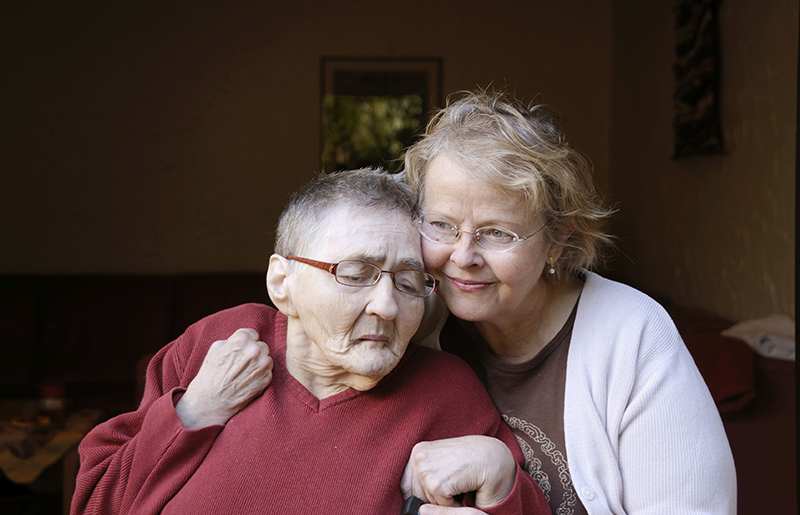




Ensuring that individuals with dementia can be seen and heard and removing the stigma of how society perceives these individuals influences our generation and the next.
Having equal access to care and support regardless of age, gender, ethnicity and religion is the way forward to ensure that the stigma associated with dementia is removed and attitudes are more positive.
Mae sicrhau bod unigolion sydd â dementia yn gallu cael eu gweld a'u clywed, a chwalu'r stigma o ran y ffordd mae cymdeithas yn gweld yr unigolion hyn yn dylanwadu ar ein cenhedlaeth ni a'r genhedlaeth nesaf.
Gallu cael gafael ar yr un gofal a chefnogaeth waeth beth fo oedran, rhywedd, ethnigrwydd a chrefydd unigolion yw'r ffordd ymlaen er mwyn sicrhau bod y stigma sy'n gysylltiedig â dementia yn cael ei chwalu a bod agweddau'n fwy cadarnhaol.

It’s important to realise that an individual with dementia still has a voice, an identity and a belonging. The care that is provided needs to support their needs and wishes. Consider the individual’s thoughts and feelings, but also remember to think about their past experiences. Remember the person that they used to be and the person they still are.
Mae'n bwysig sylweddoli bod gan unigolyn sydd â dementia lais, hunaniaeth ac ymdeimlad o berthyn o hyd. Mae angen i'r gofal a roddir gefnogi ei anghenion a'i ddymuniadau. Dylech ystyried meddyliau a theimladau'r unigolyn, ond cofiwch hefyd feddwl am ei brofiadau yn y gorffennol. Cofiwch y person oedd yr unigolyn hwn o'r blaen, a'r person ydyw o hyd.

Dementia can affect individuals and families/carers in lots of different ways. A carer’s work may be affected if they have to respond to an emergency situation, such as their relative becoming lost in once familiar surroundings. This could have an impact on their work.
There can be a psychological impact on the family as they deal with changes in their relative’s behaviour, the fear of losing their loved one and the fear that their relative will not recognise them and forget that they are their son/daughter. The relative/carer may need to spend more time with the individual, which might place a strain on their own lives as it could impact on the time that they’d usually be spending at home with their families or following hobbies etc. This could affect the relative/carer’s well-being.
There could also be a financial impact on the families/carers if the individual requires professional care to support them or if the relative/carer would need to give up work to care for them.
Gall dementia effeithio ar unigolion a theuluoedd/gofalwyr mewn llawer o wahanol ffyrdd. Efallai y bydd gwaith gofalwr yn cael ei effeithio os bydd angen ymateb i argyfwng megis bod ei berthynas yn mynd ar goll mewn amgylchedd a oedd unwaith yn gyfarwydd. Gall hyn gael effaith ar eu gwaith.
Gall fod effaith seicolegol ar aelodau o'r teulu wrth iddynt ddelio â newidiadau yn ymddygiad eu perthynas, yr ofn o golli eu hanwylyd a'r ofn na fydd eu perthynas yn eu hadnabod ac y bydd yn anghofio ei fod yn fab/merch iddynt. Bydd angen i'r perthnasau/gofalwyr dreulio mwy o amser gyda'r unigolyn, a all roi straen ar eu bywydau eu hunain gan y gallai effeithio ar yr amser y byddent fel arfer yn ei dreulio gartref gyda'u teuluoedd neu'n dilyn diddordebau ac ati. Gall hyn effeithio ar les y perthynas/gofalwr.
Gallai hefyd fod effaith ariannol ar y teuluoedd/gofalwyr os bydd angen gofal proffesiynol ar yr unigolyn i'w gefnogi neu os byddai angen i'r perthynas/gofalwr roi'r gorau i'w waith er mwyn gofalu amdano ei hun.

Dementia is different to ageing. In general, most of us will become more forgetful as we age and may rely more heavily on diaries and calendars to remember dates, appointments etc. However, dementia is a result of the brain being damaged by diseases. For example, vascular dementia is generally caused by a stroke or small vessel disease, affecting blood supply to the brain.
In order to tell the difference between what could be signs of ageing and what could be signs of dementia, a doctor would need to look at a range of factors including the individual’s daily life and their mental and cognitive abilities and rule out other possible reasons for the change.
Whilst dementia is more common in older people, it also affects younger people with over 42,000 people under the age of 65 having a dementia in the UK.
Mae dementia yn wahanol i heneiddio. Yn gyffredinol, bydd y rhan fwyaf ohonom yn mynd yn fwy anghofus wrth i ni heneiddio ac yn dod yn fwy dibynnol ar ddyddiaduron, calendrau er mwyn cofio dyddiadau, apwyntiadau ac ati. Fodd bynnag, mae dementia'n digwydd o ganlyniad i glefydau'n niweidio'r ymennydd. Er enghraifft, mae dementia fasgwlaidd yn cael ei achosi'n gyffredinol gan strôc neu glefyd pibell gwaed bychan, sy'n effeithio ar gyflenwad gwaed i'r ymennydd.
Er mwyn dweud y gwahaniaeth rhwng yr hyn a allai fod yn arwydd o heneiddio a'r hyn a allai fod yn arwydd o ddementia, byddai angen i feddyg edrych ar fywyd pob dydd yr unigolyn a'i alluoedd meddyliol a gwybyddol a diystyru rhesymau posibl eraill am y newid.
Er bod dementia yn fwy cyffredin ymhlith pobl hŷn, mae hefyd yn effeithio ar bobl iau â thros 42,000 o bobl o dan 65 oed â dementia yn y DU.

Equality, diversity and inclusion can affect individuals living with dementia in different ways. They may:
The impact of these things can be that the individual’s health may be affected as they might not receive the diagnosis or treatment that they require.
Lack of respect, privacy or dignity can lead to safeguarding issues and abuse. A person’s memory impairment may affect their ability to recall events, and changes to communication may impact upon their ability to raise safeguarding concerns.
Their choices could be taken away, leading to them becoming institutionalised and the care worker doing things to suit their needs rather than the individual’s needs.
Everyday activities, such as going to the supermarket, may become more stressful due to the individual’s changing abilities. For example, they may become disorientated, confused or bump into things because of perceptual changes. If those around them misinterpret this behaviour and fail to understand the individual’s situation due to their own ignorance, it could have a negative impact on the individual living with dementia’s self-esteem and how much they are included in their own community.
Gall cydraddoldeb, amrywiaeth a chynhwysiant effeithio ar unigolion sy'n byw gyda dementia mewn gwahanol ffyrdd. Gall y canlynol ddigwydd:
Gall y pethau hyn effeithio ar iechyd yr unigolyn dan sylw am nad yw'n cael y diagnosis neu'r driniaeth angenrheidiol o bosibl.
Gall diffyg parch, preifatrwydd neu urddas arwain at broblemau diogelu a chamdriniaeth. Gall nam ar gof unigolyn effeithio ar ei allu i ddwyn digwyddiadau i gof a gall newidiadau i gyfathrebu effeithio ar eu gallu i godi pryderon ynghylch diogelu.
Gallai golli ei ddewisiadau, gan olygu ei fod yn cael ei sefydliadu a bod y gweithiwr gofal yn gwneud pethau sy'n addas i'w anghenion ei hun yn hytrach nag anghenion yr unigolyn.
Gall gweithgareddau bob dydd, megis mynd i'r archfarchnad, ddod yn fwy o straen oherwydd galluoedd newidiol yr unigolyn. Er enghraifft, gallent ddod yn ddryslyd, yn gymysglyd neu ddechrau taro yn erbyn pethau oherwydd newidiadau canfyddiadol. Os yw’r rhai o’u cwmpas yn camddehongli’r ymddygiad hwn ac yn methu â deall sefyllfa’r unigolyn oherwydd eu hanwybodaeth eu hun, gallai gael effaith negyddol ar yr unigolyn sy’n byw â hunan-barch dementia a faint mae’n cael ei gynnwys yn ei gymuned ei hun.
Lack of knowledge and understanding may result in some individuals and their families/carers shying away from care and support with dementia for fear of embarrassment or judgement. They may think that people will see them as being ‘past it’ or ‘dangerous’ and could fear being made to live in an institution.
Seeking help for the individual with their daily life might be difficult for the family to accept as they struggle to recognise the person with dementia’s changing abilities.
They could fear the care system due to the financial impact it could have on them or because of the negative media stories they have read or heard about which could prevent them from seeking help.
Gallai ddiffyg gwybodaeth a dealltwriaeth arwain at rai unigolion a’u teuluoedd/gofalwyr fod yn amharod i dderbyn cymorth a gofal gyda dementia am fod arnynt ofn teimlo cywilydd neu cael eu barnu.
Efallai y byddant yn meddwl y bydd pobl yn ystyried eu bod ‘wedi gweld eu dyddiau gorau’ neu'n ‘beryglus’ a gallai fod arnynt ofn gorfod byw mewn sefydliad.
Gallai fod yn anodd i aelodau'r teulu dderbyn bod angen ceisio cymorth i'r unigolyn gyda'i fywyd pob dydd am eu bod yn eu cael yn anodd adnabod yr unigolyn a galluoedd newidiol dementia.
Gallai fod ofn y system gofal arnynt oherwydd yr effaith ariannol bosibl arnynt neu oherwydd y straeon negyddol y maent wedi'u darllen neu eu clywed yn y cyfryngau a allai eu rhwystro rhag ceisio cymorth.

The support that different individuals can access can be affected by their gender identity, sexuality and ethnicity, and social, cultural and religious environments.
Cultural Background – 3 per cent of people with dementia are from BAME communities – around 25,000 people; however, research suggests BAME communities often face delays in dementia diagnoses and barriers in accessing services. There are cultural differences in knowledge and understanding of dementia and some widely held misconceptions. Some might see it as bringing shame upon the family, or that the person is being punished and therefore may be reluctant to access the care and support that is required and will keep their relative “hidden”, for fear of judgement.
There could also be a language barrier which would mean that there is a lack of understanding of where or how to access support. Waiting for translation services may delay the diagnosis.
Services must support an individual’s religious and cultural beliefs and be sensitive to an individual’s rights, wishes and needs, such as support to attend a place of worship or the provision of halal meat.
LGBT+ – There may be additional challenges for some individuals due to their sexual orientation or gender identity. The fear of discrimination or judgement may result in a reluctance to engage in care and support services. They may have unique difficulties and all services need to recognise and challenge potential prejudices.
Gall hunaniaeth rhywedd, rhywioldeb ac ethnigrwydd, ac amgylcheddau cymdeithasol, diwylliannol a chrefyddol effeithio ar y cymorth y gall gwahanol unigolion ei gael.
Cefndir Diwylliannol – Mae 3 y cant o bobl â dementia yn dod o gymunedau BAME - oddeutu 25,000 o bobl, ond mae ymchwil yn awgrymu bod cymunedau BAME yn aml yn wynebu oedi wrth gael diagnosis dementia a rhwystrau wrth gyrchu gwasanaethau. Mae gwahaniaethau diwylliannol o ran gwybodaeth a dealltwriaeth o ddementia a rhai camsyniadau a ddelir yn eang. Efallai y bydd rhai yn ystyried ei fod yn peri cywilydd i'r teulu, neu fod y person yn cael ei gosbi ac felly gallant fod yn amharod i gyrchu'r gofal a'r gefnogaeth sy'n ofynnol ac a fydd yn cadw eu perthynas yn “gudd”, rhag ofn cael eu barnu.
Hefyd, gallai fod rhwystr ieithyddol a fyddai'n golygu bod diffyg dealltwriaeth o ble neu sut i gael cymorth. Gall aros am wasanaethau cyfieithu oedi'r diagnosis.
Rhaid i wasanaethau gefnogi credau crefyddol a diwylliannol unigolyn a bod yn sensitif i hawliau, dymuniadau ac anghenion unigolyn, megis cefnogaeth i fynd i addoldy neu ddarparu cig halal.
LGBT+ – Efallai y bydd heriau ychwanegol i rai unigolion oherwydd eu cyfeiriadedd rhywiol neu eu hunaniaeth rywedd. Gall ofn gwahaniaethu neu farn arwain at amharodrwydd i gymryd rhan mewn gwasanaethau gofal a chymorth. Efallai fod ganddynt anawsterau unigryw ac mae angen i bob gwasanaeth nodi a herio rhagfarnau posib.

Social movement can change people’s perception of dementia.
Health and Social Care education is taking part in schools now as part of the curriculum and is often an option subject in their last years in school. This gives exposure to the subject to the younger generation and could have a great impact on the views and behaviour of others in society.
The media has provided the world of more and more information about dementia as it is an increasing issue for the population. Changes within society, dementia friendly villages, access to health care, funding and the standard of care in homes are all factors that lead to dementia being talked about so much more.
The Human Rights Act, Equality Act and Mental capacity legislation are there to protect individuals. The Social Services and Well-Being Act ensures that a person’s wishes are taken into account and that the support offered meets their needs. The Good Work Framework ensures that appropriate dementia care training is provided for individuals working across health, social care and third sector, supporting the person living with dementia’s right to excellence.
Gall symudiad cymdeithasol newid canfyddiad pobl o ddementia.
Mae addysg Iechyd a Gofal Cymdeithasol bellach yn cael ei chynnwys mewn ysgolion fel rhan o'r cwricwlwm ac mae'n aml yn bwnc dewisol yn ystod y blynyddoedd olaf yn yr ysgol. Mae hyn yn golygu bod y genhedlaeth iau yn dod i gysylltiad â'r pwnc, a allai gael effaith sylweddol ar farn ac ymddygiad pobl eraill mewn cymdeithas.
Hefyd, mae'r cyfryngau wedi rhoi gwybod i'r byd am fwy a mwy o wybodaeth am ddementia am ei fod yn fater cynyddol bwysig i'r boblogaeth. Mae newidiadau mewn cymdeithas, pentrefi sy'n ystyriol o ddementia, y gallu i gael gofal iechyd, cyllid a safon y gofal mewn cartrefi i gyd yn ffactorau sy'n golygu bod pobl yn siarad llawer mwy am ddementia.
Mae'r Ddeddf Hawliau Dynol, y Ddeddf Cydraddoldeb a deddfwriaeth galluedd meddyliol yn bodoli i amddiffyn unigolion.
Mae'r Ddeddf Gwasanaethau Cymdeithasol a Llesiant yn sicrhau bod dymuniadau unigolyn yn cael eu hystyried a bod y gefnogaeth a gynigir yn diwallu ei anghenion. Mae'r Fframwaith Gwaith Da yn sicrhau bod hyfforddiant gofal dementia priodol yn cael ei ddarparu ar gyfer unigolion sy'n gweithio ar draws iechyd, gofal cymdeithasol a'r trydydd sector, gan gefnogi'r unigolyn sy'n byw â hawl dementia i ragoriaeth.

An individual with dementia still has an identity and image. They still have a history, likes, dislikes and a personality, so it’s important to focus on what the individual still has and not what they don’t have.
Finding out about what they love, their history, hobbies etc. can enable an individual with dementia to cope better with the changes they are currently experiencing or have experienced in the past. This can enable the individual to still feel worthy and have an image and identity.
Focusing on what they are still able to do will relieve their feelings of frustration and anxiety and will mean they are less scared of losing control over things.
Finding ways of supporting individuals to still carry out some of their daily tasks is a valid part of them still feeling in control. Simple things like adding labels in the kitchen can aid them to still be able to cook or remember to wash up etc. Timers around the house and notes can be used as a memory aid.
Mae gan unigolyn â dementia hunaniaeth a delwedd o hyd. Mae ganddo hanes, hoff bethau a chas bethau a phersonoliaeth o hyd, felly mae'n bwysig canolbwyntio ar yr hyn sydd ganddo yn hytrach na'r hyn nad oes ganddo.
Gall dod i wybod beth mae'n ei fwynhau, ei hanes, ei ddiddordebau ac ati alluogi unigolyn â dementia i ymdopi'n well â'r newidiadau y mae'n eu hwynebu ar hyn o bryd neu wedi eu hwynebu yn y gorffennol. Gall hyn alluogi'r unigolyn i deimlo'n deilwng a chael delwedd a hunaniaeth o hyd.
Bydd canolbwyntio ar yr hyn y mae'n dal i allu ei wneud yn lleddfu ei deimladau o rwystredigaeth a phryder ac yn golygu bod arno lai o ofn colli rheolaeth dros bethau.
Mae dod o hyd i ffyrdd o helpu unigolion i barhau i gyflawni rhai o'u tasgau beunyddiol yn bwysig er mwyn iddynt ddal i deimlo bod ganddynt reolaeth. Gall pethau syml fel ychwanegu labeli yn y gegin eu helpu i allu parhau i goginio neu gofio golchi'r llestri ac ati. Gellir defnyddio amseryddion o gwmpas y tŷ a nodiadau fel cymorth cof.

Ensure that you use language that is appropriate to the individual. Don’t patronise them, and continue to communicate with them in a way they would wish to be communicated to and how you’d want to be communicated to.
Educate those that have a negative perception of dementia. Talk to them about what they know about the disease, teach them the facts and help them understand that the person with the dementia is still someone’s parent, daughter, son, friend etc. Treating them with respect and dignity and empowering them will change how society views people with dementia.
Sicrhewch eich bod yn defnyddio iaith sy'n briodol i'r unigolyn. Peidiwch â siarad yn nawddoglyd ag ef – dylech barhau i gyfathrebu ag ef yn y ffordd y byddai'n dymuno ac yn y ffordd y byddech chi am i rywun gyfathrebu â chi.
Addysgwch bobl sydd â chanfyddiad negyddol o ddementia. Siaradwch â nhw am yr hyn y maent yn ei wybod am y clefyd, addysgwch nhw am y ffeithiau a helpwch nhw i ddeall bod y person â dementia yn dal i fod yn rhiant, yn ferch, yn fab neu'n ffrind i rywun o hyd. Bydd eu trin â pharch ac urddas a'u grymuso yn newid y ffordd mae cymdeithas yn gweld pobl â dementia.

Words matter. Using the correct words to describe dementia is important for society to get it right and to create a positive impact for the individuals. We should use terms such as an individual living with dementia, an individual affected by dementia rather than a dementia sufferer, patient etc.
There are many guides available which you can give out to individuals to educate them to avoid negative language and prejudice.
Ensure you stand up for the individual’s rights and continue to work in a person-centred way, challenging views and perceptions that reinforce the myths or stereotypes about dementia.
Mae geiriau yn cyfrif. Mae defnyddio'r geiriau cywir i ddisgrifio dementia yn bwysig er mwyn i gymdeithas wneud pethau'n iawn a chael effaith gadarnhaol ar yr unigolion dan sylw. Dylem ddefnyddio termau fel unigolyn sy'n byw â dementia, unigolyn y mae dementia yn effeithio arno yn hytrach na dioddefwr, claf dementia ac ati.
Mae llawer o ganllawiau ar gael y gallwch eu rhoi i unigolion er mwyn eu haddysgu i osgoi iaith negyddol a rhagfarn.
Sicrhewch eich bod yn sefyll i fyny dros hawliau'r person ac yn parhau i weithio mewn ffordd sy'n canolbwyntio ar yr unigolyn, herio safbwyntiau a chanfyddiadau sy'n atgyfnerthu'r mythau neu'r ystrydebau ynghylch ddementia.